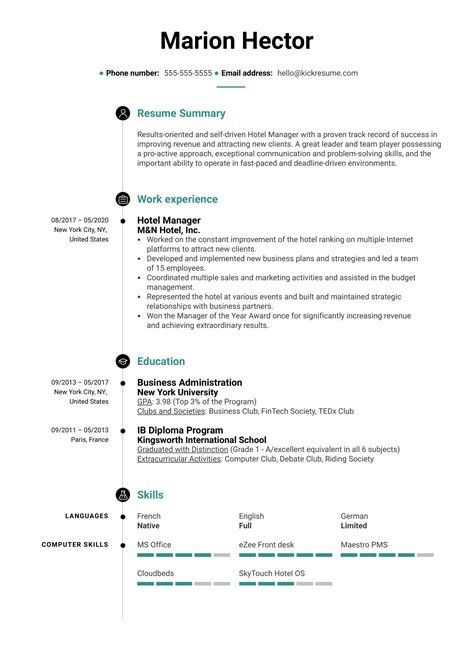Maximize your job search with our guide to traditional and functional resume formats. Learn the best way to showcase your skills and experience.Are you a hospitality professional looking to land your dream job in hotel management? Crafting the perfect resume is crucial in showcasing your qualifications and experience to potential employers. In this blog post, we will explore the different resume formats specifically tailored for the hotel management industry. From the traditional resume format to the combination of skills and experience, we will delve into the pros and cons of each style to help you determine the best approach for your unique career journey. Whether you’re a seasoned hotel manager or a fresh graduate eager to break into the industry, understanding the nuances of resume formatting can make a significant impact on your job search. Join us as we unravel the intricacies of resume writing for hotel management roles and learn how to present yourself in the best possible light to prospective employers.
Traditional Resume Format
Traditional Resume Format
In the traditional resume format, your work experience is listed in chronological order, starting with your most recent position and working backwards. This format is the most commonly used and is ideal for individuals with a solid work history and a clear career progression. It allows employers to easily see your career path and the growth you have experienced over the years. By listing your work experience in reverse chronological order, you highlight your most recent and relevant roles, which can quickly grab the attention of potential employers.
The traditional resume format also includes a professional summary or objective at the top, which provides a brief overview of your skills, experience, and career goals. This section is a great opportunity to showcase your value proposition and make a strong first impression. Additionally, the traditional resume format typically includes sections for education, certifications, and relevant skills, allowing you to provide a comprehensive overview of your qualifications and credentials.
Overall, the traditional resume format is a tried and true method for presenting your work experience and qualifications to potential employers. It allows you to showcase your career progression and highlight your most recent and relevant roles, making it easier for hiring managers to see the value you can bring to their organization. While there are other resume formats available, the traditional format remains a popular choice for many job seekers due to its simplicity and effectiveness in showcasing a candidate’s work history and qualifications.
Chronological Order of Work Experience
When it comes to creating a resume, the chronological order of work experience is a common format that many people use. This format lists your work experience in reverse chronological order, starting with your most recent job and working backwards. This allows potential employers to see the progression of your career and easily identify your most recent and relevant experience.
Using the chronological order of work experience on your resume can be beneficial for several reasons. It helps to demonstrate your career growth and progression, as well as showing a clear timeline of your work history. This format also makes it easy for employers to quickly see your most recent experience, which can be especially important in industries where recent experience is crucial.
One potential downside of the chronological order of work experience is that it can emphasize any employment gaps or frequent job changes, which may not always work in your favor. However, with a well-crafted resume and cover letter, you can address any potential concerns and still effectively demonstrate the value of your experience.
Functional Skills-Based Resume
A functional skills-based resume is a type of resume format that focuses on highlighting the skills and abilities of the candidate rather than the chronological order of their work experience. This type of resume is particularly useful for individuals who are looking to make a career change, have gaps in their employment history, or have limited work experience in a particular field.
With a functional skills-based resume, the emphasis is placed on the key skills and accomplishments that are most relevant to the job being applied for. This allows the candidate to showcase their strengths and capabilities, making it easier for potential employers to see how they can add value to the company.
When creating a functional skills-based resume, it is important to carefully tailor the content to align with the specific job requirements. By using keywords and phrases that are relevant to the job, the candidate can increase their chances of getting noticed by hiring managers and recruiters.
Combination of Skills and Experience
When it comes to creating a resume, there are different formats to choose from. One of the options available to job seekers is the combination resume format. This type of resume focuses on both the candidate’s skills and work experience, making it an ideal choice for individuals with a strong skill set in a particular field.
With the combination resume format, the emphasis is on the candidate’s abilities and accomplishments, while also providing a chronological list of their work experience. This gives employers a comprehensive understanding of the candidate’s skills and experience, allowing them to see how the candidate’s qualifications align with the job requirements.
Job seekers looking to highlight their skills and experience in fields such as hotel management can benefit from using the combination resume format. By showcasing their relevant skills at the top of the resume, followed by a detailed list of their work experience, candidates can effectively demonstrate their qualifications for the desired position.
